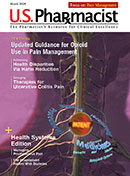An article in IFAR: International Forum of Allergy & Rhinology discusses a new randomized, controlled trial that found patients who underwent endoscopic sinus surgery (ESS) had no differences in outcomes—including symptoms and infections—whether they took an antibiotic or placebo after surgery.
Citing “minimal data” to support the common practice, the authors sought to assess the effects of post‐ESS antibiotics on infection, quality of life (QOL), and endoscopic scores. The randomized, double‐blind, placebo‐controlled, noninferiority trial compared amoxicillin‐clavulanate versus placebo after ESS in 77 adults with chronic rhinosinusitis (CRS). Patients who were refractory to appropriate medical therapy underwent ESS; 37 were randomized to antibiotics, while 40 received a placebo.
Participants were followed clinically (mean ± standard deviation: 1.3 ± 0.3 and 8.8 ± 3.9 weeks postoperatively). At baseline and follow‐up, researchers measured quality of life (QOL) with 22‐item Sino‐Nasal Outcome Test (SNOT) questionnaires, also including Lund‐Kennedy (LK) endoscopic scores.
Results indicate that placebo was noninferior to antibiotic prophylaxis with regard to postoperative SNOT‐22 scores (β = 0.18, 2‐tailed P <.05). No significant differences between the antibiotic and placebo groups in LK score trajectories over time P = 0.63) or in postoperative infection rates (2.6% vs. 2.4%, respectively; P = .96) were detected. Yet the rate of diarrhea was significantly higher in the antibiotic group (24.3% vs. 2.5%; relative risk = 10.8; P = .02).
“These findings add to the growing evidence that routine use of prophylactic postoperative antibiotics does not improve outcomes post‐ESS and significantly increases the rate of diarrhea,” the authors conclude.
“For routine sinus surgery, antibiotics are unnecessary and may cause more complications like gastrointestinal side effects,” added cosenior author Eric H. Holbrook, MD, director of the Division of Rhinology at Mass Eye and Ear and Associate Professor of Otolaryngology-Head and Neck Surgery at Harvard Medical School. “There have been studies that have suggested antibiotics might help or maybe they don’t, and we sought to clear that up through a rigorous randomized trial.”
Cosenior author Stacey T. Gray, MD, director of the Sinus Center at Mass Eye and Ear and an Associate Professor of Otolaryngology-Head and Neck Surgery at Harvard Medical School, advised, “Our findings suggest that otolaryngologists can rethink the practice of routinely prescribing antibiotics after endoscopic sinus surgery. Antibiotics should still be considered when the benefits outweigh the risks, including complex surgical procedures are performed or if the patient is at greater risk for developing an infection."
More than 250,000 sinus surgeries occur each year for treating chronic sinus infections that don't respond to other medical treatment, background information in the study points out.
The content contained in this article is for informational purposes only. The content is not intended to be a substitute for professional advice. Reliance on any information provided in this article is solely at your own risk.
« Click here to return to Weekly News Update.






